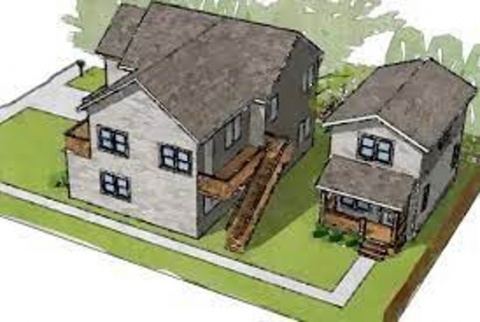
Georgetown, Del., June 25, 2024: Sussex County is accessorizing its housing stock with a new set of rules aimed at promoting affordability.
County Council, at its Tuesday, June 25, 2024, meeting, approved an ordinance that amends County code as it pertains to accessory dwelling units (ADUs), living spaces secondary to primary residences that have been permitted, albeit limitedly, in Sussex County for decades. However, the housing type, sometimes known colloquially as ‘in-law suites’, has been used sparingly, in part because of land use rules that officials said were too restrictive and outdated.
“We are taking an old product and simply making it better,” County Administrator Todd F. Lawson said. “This will make it easier, more streamlined and straightforward to help promote more flexibility and affordable housing options in Sussex County.”
The ordinance reclassifies what has been termed in County code since the late 1990s as ‘garage/studio apartments’, labeling them now as accessory dwelling units (ADUs), and broadening the rules for where and how such secondary housing can be implemented. County officials say the changes will make the County consistent with statewide and national housing code practices, and will be another tool in helping in the County government’s efforts to promote affordable housing options in southern Delaware.
Among some of the changes, applicants will no longer be required to go before the County’s Board of Adjustment to seek special use exception approval to include an accessory dwelling unit on their residential lot. The rules previously limited such spaces to detached units only, such as converted space above a garage separate of a single-family house, and capped the living space to 800 square feet.
Meantime, the new rules will allow for more options, whether separate of an existing housing unit or attached, and raise the maximum floor area to 1,000 square feet. The new rules also will allow accessory dwelling units to have self-contained kitchen space, a major feature of living quarters that was previously prohibited under County code.
Any lot proposed to include an ADU still would be required to have adequate sewer capacity, and would have to be reviewed by County staff to ensure appropriate setbacks, as well as any required building permits are filed. Private deed restrictions or homeowners’ association rules governing secondary housing units would take precedence over the new County rules, while the ordinance is applicable only in unincorporated parts of the county, not municipalities.
“The old rules really were impractical and have not done much to create truly usable, livable space,” Mr. Lawson said. “Housing needs, especially affordability, are very much top of mind today, so we wanted to look at what ways we could, from a land use standpoint, give the public the flexibility they need and promote affordability and housing options here in Sussex County.”
Historically, secondary housing units comprise a fraction of the County’s overall housing stock, with fewer than 75 of the units approved in the County in the past five years. The County has permitted the housing type since 1998.
County Council President Michael H. Vincent said the change is in response to market demands and the shift in the public’s desire for more options that suit familial or economic needs.
“We have heard from many of our residents about the rising cost of housing, and the difficulty some people face, especially those who work in an area where they can’t afford to live,” Mr. Vincent said. “Council and staff realize we have an opportunity before us to put into place something that can help with the issues of affordability, and housing in general. This is a great start, and it’s our intent to keep working to find other ways that will help our residents and improve our communities.”
The new rules take effect immediately. To read the ordinance, visit https://sussexcountyde.gov/ordinances.
###
